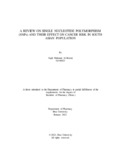A review on Single Nucleotide Polymorphism (SNPs) and their effect on cancer risk in South Asian population

View/Open
Date
2021-01Publisher
Brac UniversityAuthor
Beruni, Sajid Mahmud AlMetadata
Show full item recordAbstract
Cancer is one of the leading causes of death and currently 1 in 6 death is known to occur due to cancer. Each type of cancer is linked to variations occurring in the gene. Any form of genetic variation which disrupts the biological function usually causes cancer. Single nucleotide polymorphism (SNP) is the most common form of genetic variation. SNPs are when one nucleotide is replaced by another by another nucleotide. SNPs mainly occur in the promoter, exon, intron and untranslated region (UTR) of a gene. So the function of a gene if affected by the position where a SNP occurs. The study of SNP can be utilized to find out the disease causing genes and develop more precise medicine. SNPs are mainly employed as genetic markers and can help us predict cancer. Currently the population of South Asian is above 1 billion according to World Bank. Identifying the most commonly occurring SNPs in the South Asian population will give us a better understanding on cancer and to recognize the molecular mechanisms involved in a disease which can serve as predictive markers and possible drug target-sites for pharmacological action.
